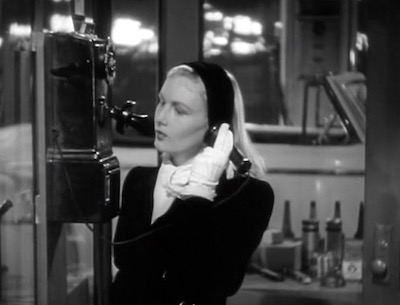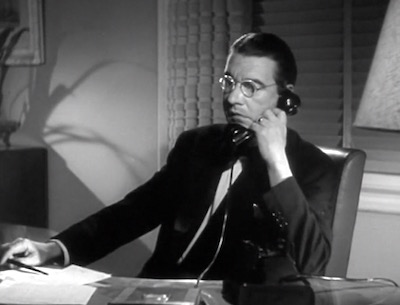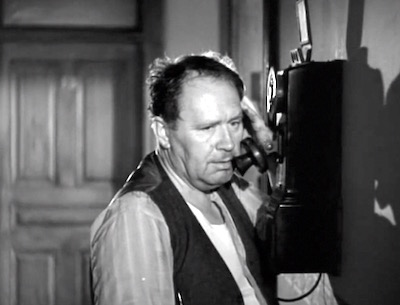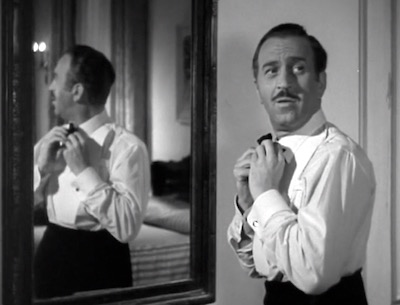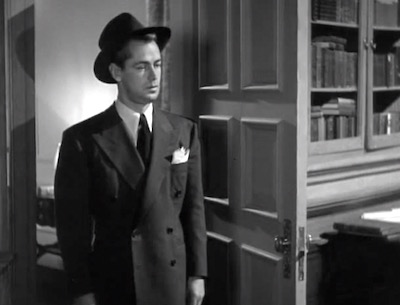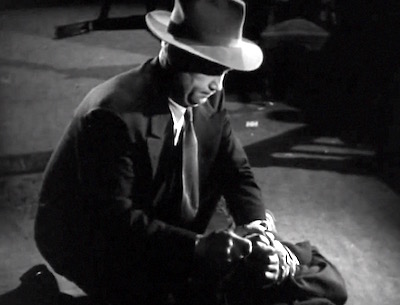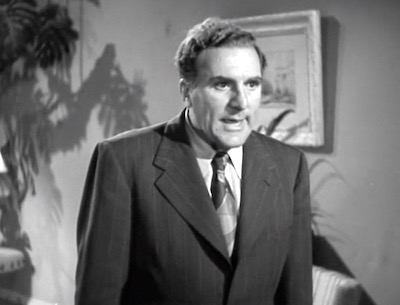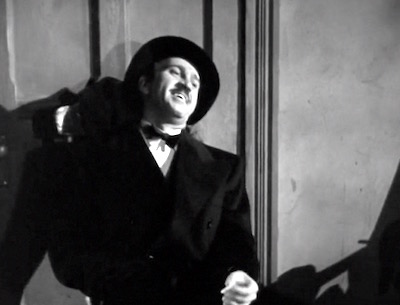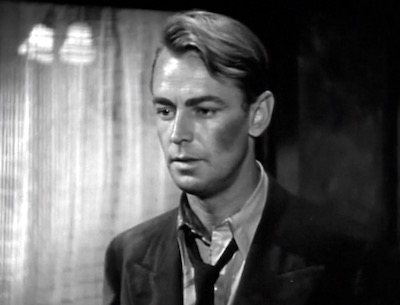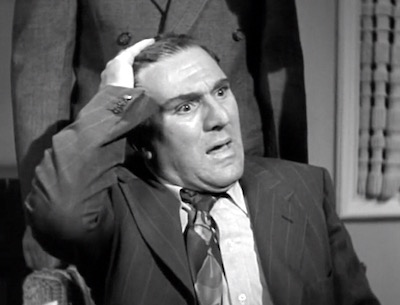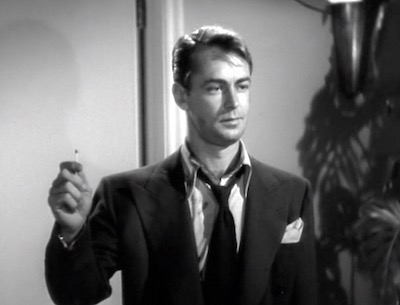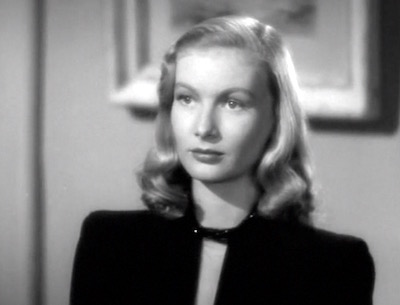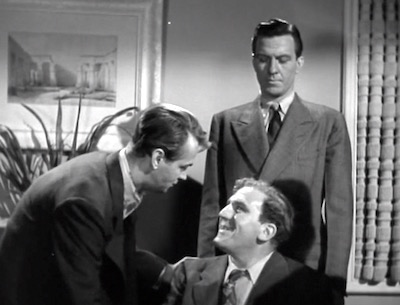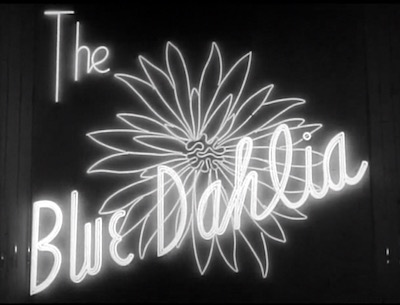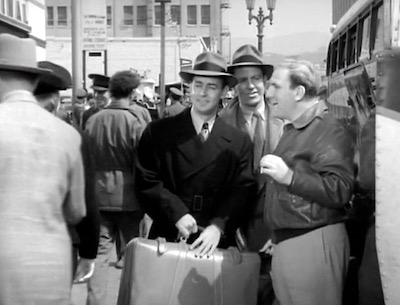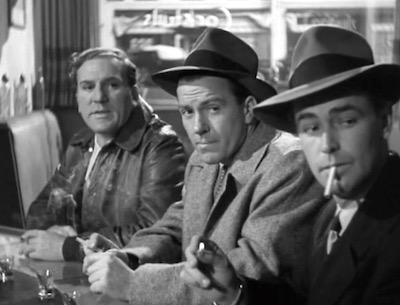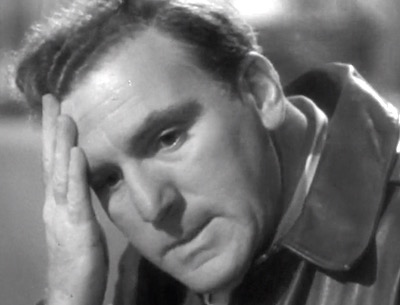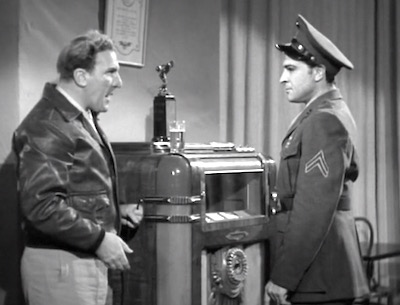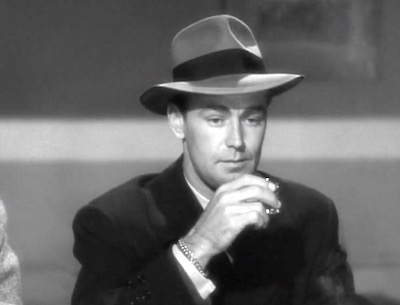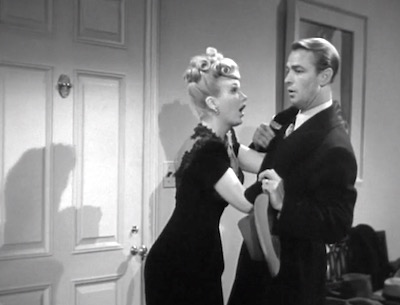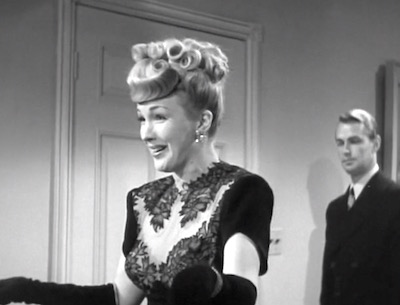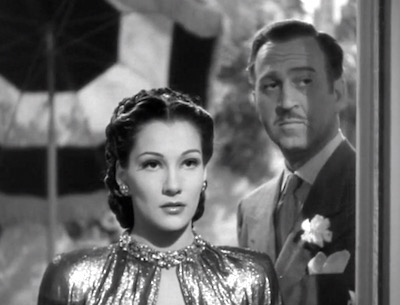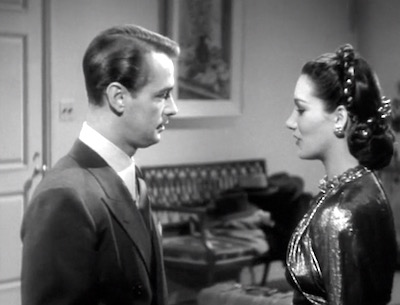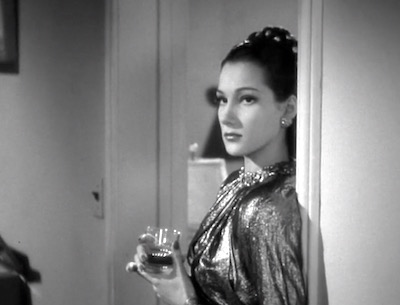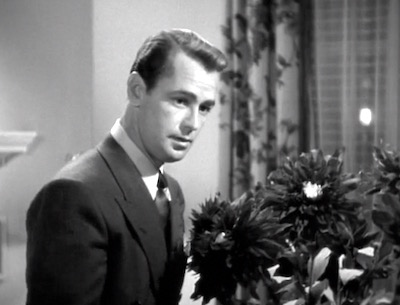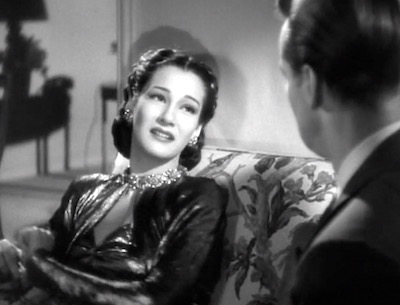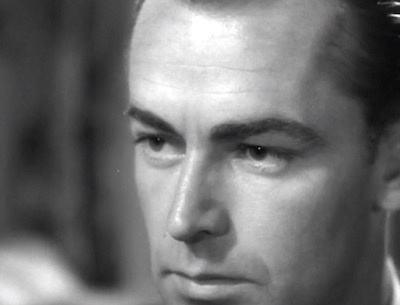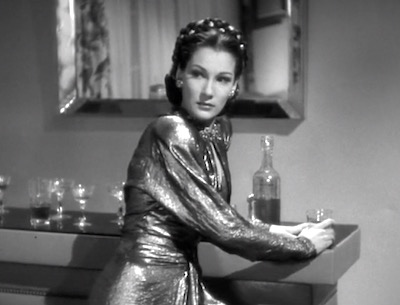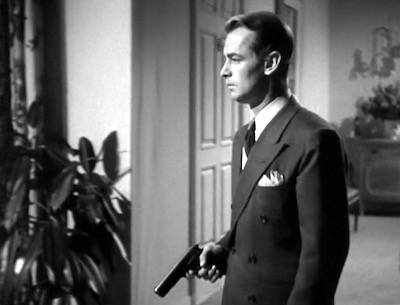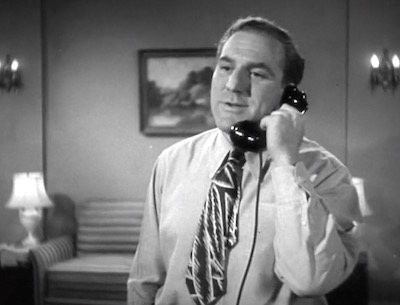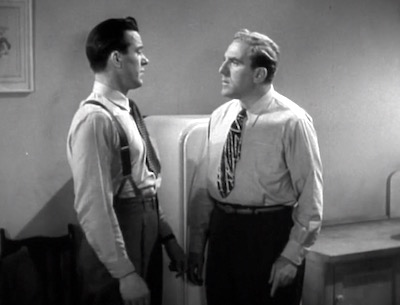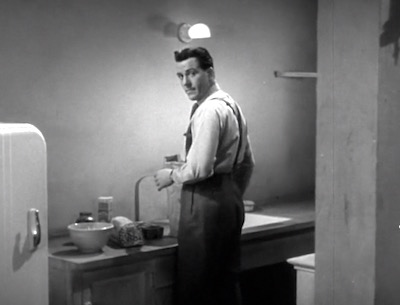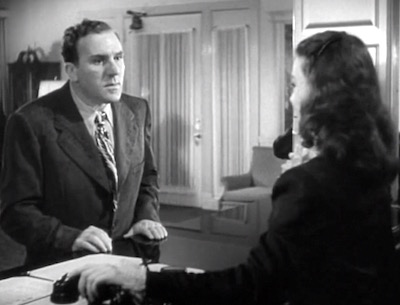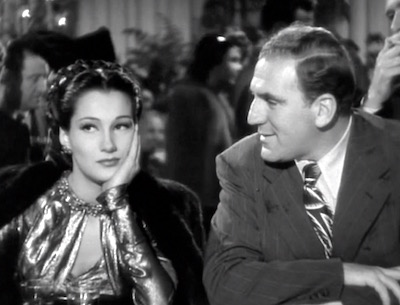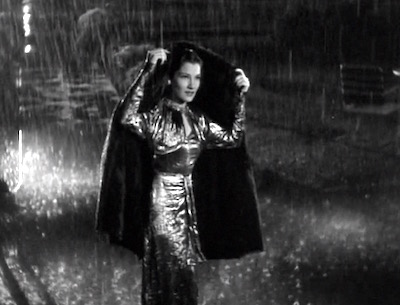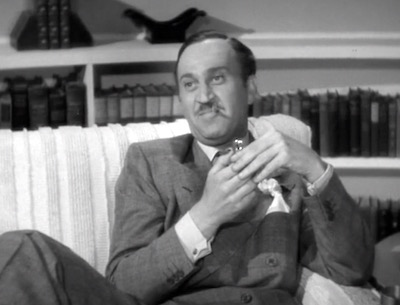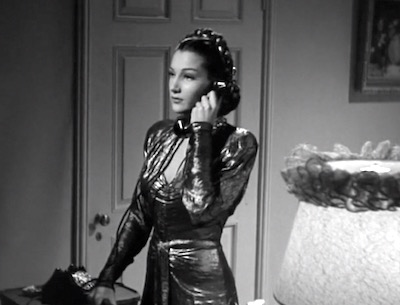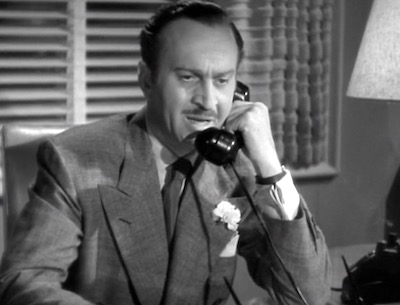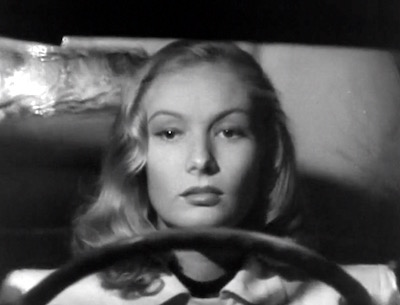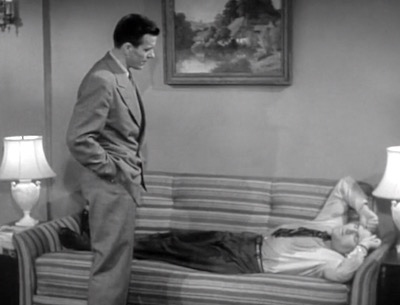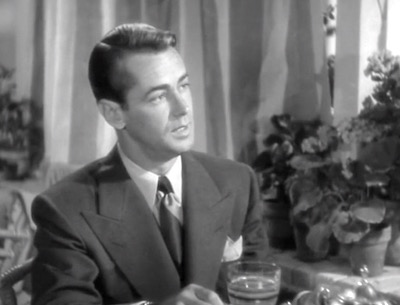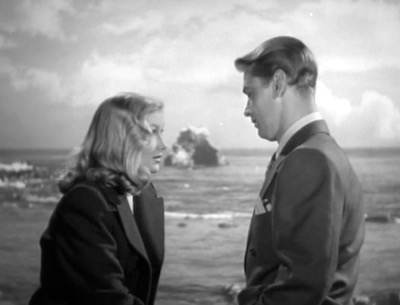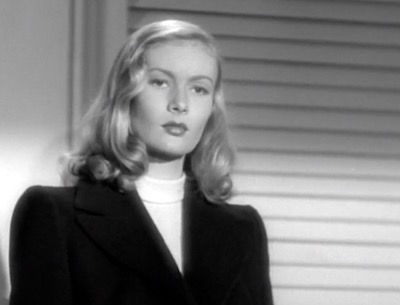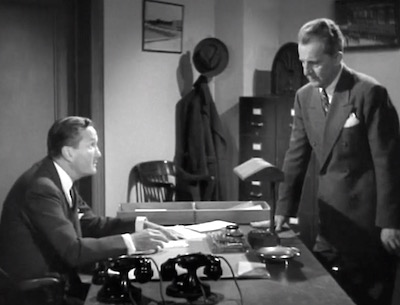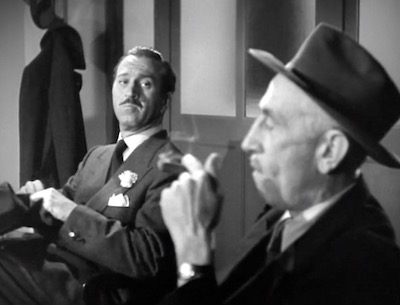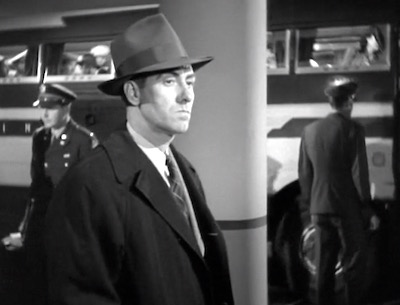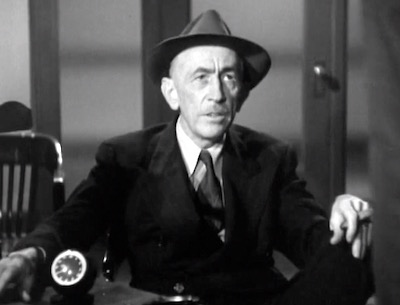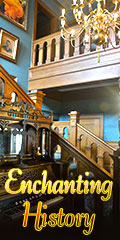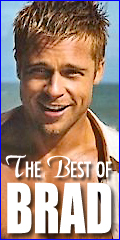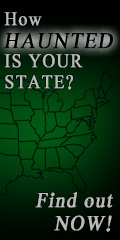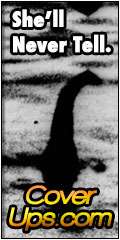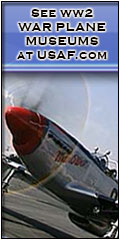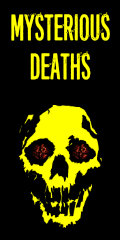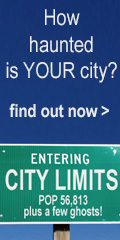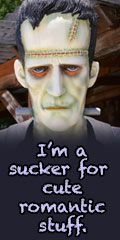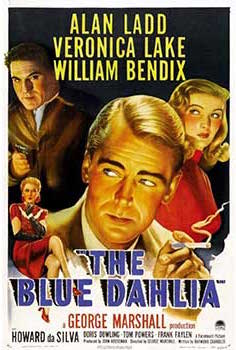
Directed by: George Marshall
Screenplay by: Raymond Chandler
Cast:
- Alan Ladd as Johnny Morrison / "Jimmy Moore"
- Veronica Lake as Joyce Harwood
- William Bendix as Buzz Wanchek
- Howard Da Silva as Eddie Harwood
- Doris Dowling as Helen Morrison
- Hugh Beaumont as George Copeland
- Tom Powers as Captain Hendrickson
- Howard Freeman as Corelli
- Don Costello as Leo
- Will Wright as "Dad" Newell
Tagline: “Double dame trouble! Double-barreled action!”
Three discharged United States Navy officers — Johnny Morrison, Buzz Wanchek and George Copeland — arrive in Hollywood. During the war they flew together in the same flight crew in the South Pacific. Buzz suffers from shell shock and has a metal plate in his head.
While George and Buzz get a flat together, Johnny surprises his wife Helen at her old apartment, which is patrolled by house detective "Dad" Newell. He discovers that she's having an affair with Eddie Harwood, owner of the Blue Dahlia nightclub. Helen, drunk, confesses to Johnny that their son Dickie, whom Johnny believed died of diphtheria, actually died in a car crash that occurred because she was driving drunk. Newell sees Johnny and Helen fight. Later Johnny pulls a gun on Helen, but drops it and leaves. Helen calls Buzz and tells her about the fight.
Buzz goes out to find Johnny. He meets Helen and, unaware of her identity, goes to her bungalow for a drink.
Eddie breaks up with Helen, but Helen blackmails him into seeing her again.
Johnny is picked up in the rain by Joyce Harwood, who's separated from Eddie. Neither reveals their name, and they spend the night in separate rooms in a Malibu inn. The next morning, they have breakfast and he decides to give his marriage another chance. Then the radio announces that Helen has been murdered and that Johnny is a suspect.
The police interview Newell, Harwood, Buzz and George.
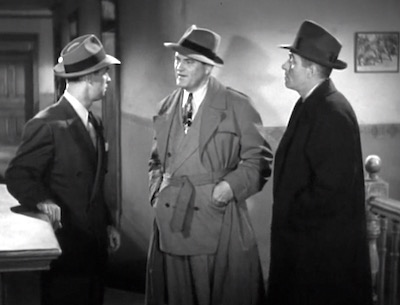
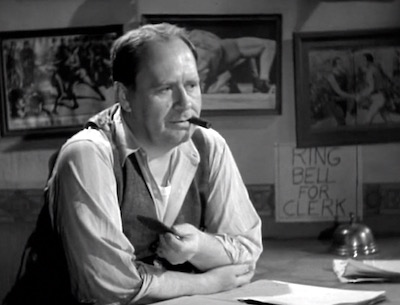
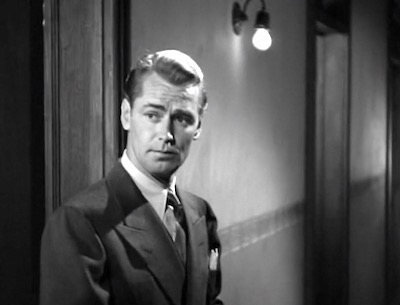
After Johnny checks into a cheap hotel under an assumed name, Corelli, the hotel manager, finds Johnny's photo of himself with Dickie and tries to blackmail him. Johnny beats Corelli up, then discovers that on the back of the photo, Helen has revealed that Eddie is really Bauer, a murderer wanted in New Jersey.
Corelli revives and sells information on Johnny's identity to a gangster named Leo, who kidnaps him.
Buzz and George visit Eddie at the Blue Dahlia, and Joyce introduces herself. As Joyce picks at a blue dahlia flower, the nightclub's music sets off a painful ring in Buzz's head, and lapsing into a fit, he remembers the agonizing music he heard while at Helen's bungalow as she played with a blue dahlia.
Johnny eludes Leo's henchmen as Eddie arrives and forces him to admit that fifteen years before he was involved in the shooting of a bank messenger.
Leo tries to shoot Johnny, but hits Eddie instead. Johnny flees to the Blue Dahlia, where the police are pressuring a confused Buzz to admit that he killed Helen.
Johnny enters and suggests that Joyce turn up the music. As his head pounds, Buzz remembers leaving Helen alive in her bungalow. Police Captain Hendrickson then confronts Newell with the accusation that he tried to blackmail Helen about her affair, and when she refused to comply, killed her. Newell tries to escape from the office but is shot by Hendrickson.
Later, outside the Blue Dahlia, Buzz and George decide to go for a drink, leaving Johnny and Joyce together.
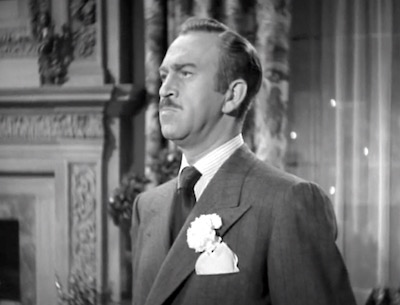
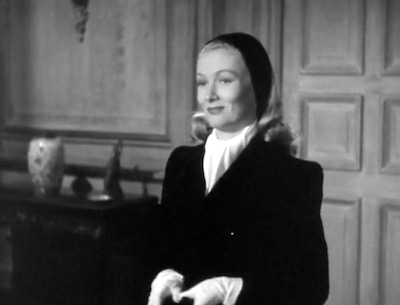

Making of the Film
Paramount was in search of a new vehicle for Alan Ladd and producer John Houseman approached Raymond Chandler, who wrote a 90-page treatment in two weeks. It was the first original script for the screen that he ever wrote. Paramount agreed to buy the project.
The film was announced in early 1945. Ladd, Lake, Bendix and Marshall were also all attached from the beginning.
Ladd had served for ten months in the army in 1943 before being honorably discharged due to illness; however he was recently re-classified 1-A for the World War II military draft, and may have had to go back into the Army. Paramount kept applying for deferments so he could make films but he was due for induction in May 1945; as a result The Blue Dahlia had to be written and produced quickly.
Shooting began in March 1945 without a completed screenplay. According to Houseman:
"It was not until the middle of our fourth week that a faint chill of alarm invaded the studio when the script girl pointed out that the camera was rapidly gaining on the script. We had shot sixty-two pages in four weeks; Chandler, during that time, had turned in only twenty-two-with another thirty to go."
The problem was the ending. Originally Chander wanted the killer to be Buzz having a blackout. However the Navy objected to the story's portrayal of a service man as a murderer, and Paramount told Chandler he had to come up with a new ending. Chandler fell into a state of writer's block. Houseman remembers:
"Still, I was not worried. Ray had written such stories for years and I was quite confident that sooner or later (probably later since he seemed to enjoy the suspense) he would wind up the proceedings with an 'artistic' revelation (it was his word) and a caustic last line. But as the days went by and the camera went on chewing its way through the script and still no ending arrived, signs of tension began to appear."
Paramount offered Chandler a $5,000 incentive to finish the script but this didn't work according to Houseman:
"It was the front-office calculation, I suppose, that by dangling this fresh carrot before Chandler's nose they were executing a brilliant and cunning maneuver. They did not know their man. They succeeded, instead, in disturbing him in three distinct and separate ways: One, his faith in himself was destroyed. By never letting Ray share my apprehensions, I had convinced him of my confidence in his ability to finish the script on time. This sense of security was now hopelessly shattered. Two, he had been insulted. To Ray, the bonus was nothing but a bribe. To be offered a large additional sum of money for the completion of an assignment for which he had already contracted and which he had every intention of fulfilling was by his standards a degradation and a dishonor. Three, by going to him behind my back they had invited him to betray a friend and fellow Public School man. The way the interview had been conducted ('sneakily') filled Ray with humiliation and rage."
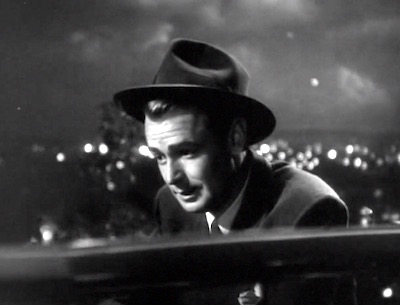
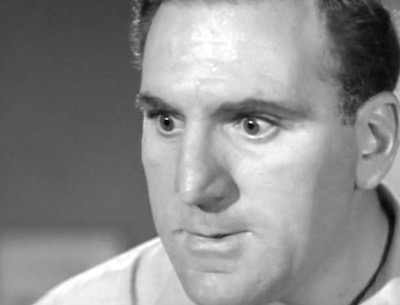
Chandler wanted to quit, but Houseman convinced him to think about it. The next day Chandler said he would be able to finish the film if he resumed drinking. Houseman said the writer's requirements were "two Cadillac limousines, to stand day and night outside the house with drivers available," "six secretaries," and "a direct line open at all times to my office by day, to the studio switchboard at night and to my home at all times." Houseman agreed and says Chandler then started drinking.
"He did not minimize the hazards," said Houseman in 1964, "he pointed out that his plan... would call for deep faith on my part and supreme courage on his, since he would in effect be completing the script at the risk of his life. (It wasn't the drinking that was dangerous, he explained, since he had a doctor who gave him such massive injections of glucose that he could last for weeks with no solid food at all. It was the sobering up that was dangerous; the terrible strain of returning to normal living).
At the end of that time, Chandler presented the finished script.
He was unhappy with the contrived ending and with Veronica Lake's performance as Joyce Harwood. "The only times she's good is when she keeps her mouth shut and looks mysterious," he told a friend. "The moment she tries to behave as if she had a brain she falls flat on her face. The scenes we had to cut out because she loused them up! And there are three godawful close shots of her looking perturbed that make me want to throw my lunch over the fence."
Chandler received much deference on the set, but Veronica Lake was not familiar with him; so, upon asking about him and being told, "he's the greatest mystery writer around", she made a point of listening intently to an analysis of his work by the film's publicity director in order to impress newspaper reporters with her knowledge of a writer she'd actually never read. Chandler developed an intense dislike for Lake and referred to her as "Moronica Lake".
Lake later said of her role "I'm not much of a motivating force, but the part is good."

